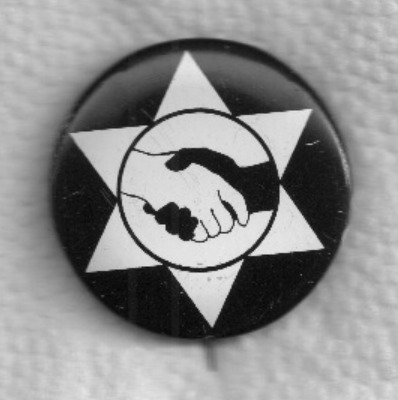Exploring Jewish futurism as a concept and an art and writing genre. Reading recommendations welcome!
Last active 60 minutes ago
Don't wanna be here? Send us removal request.
Text
My WIP is a secondary world fantasy and I don’t remember why I originally decided to do secondary world instead of historical fantasy like the other two but some factors include:
- kinda wanted to see if I could pull off “fantasy Judaism” to my own satisfaction (it’s difficult because so many factors go into making Jewish cultures what they are historically)
- gives me a bit more flexibility re: politics, how alchemy works, etc
- “I just felt like it” <- this may be the realest answer
47 notes
·
View notes
Text
70 notes
·
View notes
Note

A Bat/Bar/B'nei Mitzvah, Anywhere in the World
139 notes
·
View notes
Photo

An Iraqi Silver-Mounted and Painted Wood Torah Case, 1883.
(cylindrical with onion-domed top, the exterior covered with silver repousse panels of flowering urns and Hebrew inscription dated 1883, set with green glass beads, the interior set with two silver plaques with additional floral motifs and donation inscription, the wood painted with flowerheads)
737 notes
·
View notes
Text

myjewishlearningcom
Did you know the mezuzah has biblical origins? In Deuteronomy, God commands the Israelites: "And you shall inscribe these words on the doorposts (mezuzot) of your house and on your gates." This mitzvah is fulfilled by hanging a mezuzah on doorposts in one's home. Learn more about the history of the mezuzah and find out how to hang your own by tapping our link in bio! Art by Avital Dayanim
83 notes
·
View notes
Note
Have you ever seen a scroll (like for writing on/reading) in real life?
864 notes
·
View notes
Text
If you're thinking of attending a synagogue service as a way to support your local Jewish community but don't know how:
I'm writing this on 10/13/23, but this applies to any occasion when the Jewish community might be in a state of fear or sadness, or when you might be moved to show support for your local Jewish community by showing up. The main comment I've gotten from people who want to do this is that they don't know how to begin, so here's a quick guide for how to actually do that if you've never been to or interacted with a synagogue before.
How to choose a synagogue
How to ask first
What to wear and bring
When you get there
Additional notes
How to choose a synagogue
Depending on where you live, googling "synagogue [zip code]" may get you a lot or very few hits. Look at the synagogue's website for hints.
If you see the words "messianic" or "yeshua" that's not a real synagogue, that's predatory Christians hoping to be mistaken for Jews. Supporting them does not support your local Jewish community.
Check for the words "Orthodox," "Conservative," "Reconstructing Judaism," or "Reform" to help know what to expect. If you would be distressed to encounter segregated seating by binary gender, that's a reason you might avoid an Orthodox synagogue. The word "Conservative" in this context does not refer to political opinions, it's the name of a denomination just like Orthodox, Reconstructing, and Reform--what's being conserved in Conservative Judaism is liturgical traditions and religious observances. In fact, in most of these settings, to a lesser or greater extent depending on your specific location, you are likely to find the majority of people leaning generally to the left of your local average, politically. Which isn't to say there won't be outliers, that's just the typical makeup. In terms of service length, a Reform synagogue service is likely the shortest. It will also likely contain the most English during the service. No mainstream denomination of Judaism practices proselytizing. You should not fear that anyone will actively try to convert you.
On the synagogue website they should list start times for Friday night and Saturday morning services. That will help you choose a service you might be able to attend. I'll add notes on the differences and what to expect from either later on.
How to ask first
Not all communities will find an unexpected visitor to be a safe situation, no matter how good your intentions may be. Before you show up at a synagogue, check the website for the email addresses for the rabbi and either the president or "info" or something similar. Here's a model script for you to use:
Hi Rabbi [Lastname], I'm not Jewish but was looking for ways to show support to our local Jewish community and wondered if it would be appropriate to attend a service this coming [Friday/Saturday] as a way of showing my local Jewish community that you are not alone. If that would not be appreciated, is there another gesture an individual could make that would help this community feel supported? Otherwise, what do I need to know in order to be respectful to your community while attending a service? Sincerely, [your name]
You can also ask about accessibility questions you might have in the same email.
In a larger city or a place that has recieved threats of violence recently, they may be more cautious, but a synagogue in a small city or suburban area may simply say that anyone is welcome to show up to any service.
What to wear and bring
If the rabbi or synagogue office emails back with clothing guidelines, follow them. If not, bet on business casual as a dress code: for a masculine presentation, slacks, a button-down shirt with or without a tie, and a blazer or sweater, and for a feminine presentation slacks or a skirt knee length or longer, with a top that covers the shoulders. for Orthodox and some Conservative synagogues, wear long or three-quarter sleeves. In an Orthodox synagogue, women typically wear dresses and skirts rather than pants. I would advise avoiding wearing a visible cross while attending a service of any Jewish denomination.
You don't need to bring anything in particular with you. Be sure to place your cell phone on silent and double-check that any alarms are turned off. In Orthodox and many other synagogues, people may avoid carrying wallets with them, but no one should be offended that you have yours with you as a visitor.
This should go without saying but do not bring any kind of weapon with you. In a large city with high security needs your bag may be searched or you may be asked to show ID before entering. It is very likely that you will see a uniformed police officer or armed security guard. Synagogues in large cities might have dramatically increased their security presence this week. A visitor who is being respectful to the community is not what they're looking for.
Jewish people attending the service may bring prayer shawls or kippot (singular: kipa, also called yarmulkes) to wear. A visitor is not expected to have these. Most synagogues have baskets of kippot available at the entrance for guests. In Orthodox communities, men should wear one while in the building and women should not. In Conservative communities men should wear one and others may decide to wear one or not. In any other community you may but are not expected to wear a kipa. There will likely also be a rack of prayer shawls at the door, but non-Jews are not expected to wear these.
When you get there
Someone may make a point of approaching you early on. Please don't be embarrassed to tell them that you're not Jewish. Some synagogues will make a point on Saturday morning of assigning an "honor," that is, a role in the service, to Jewish newcomers. If someone approaches you to offer you an honor or asks you a question you don't understand, you can say "Thank you, I'm not Jewish, I'm visiting to show support for the community." Alternately, someone may simply approach you to welcome you and help you get situated.
If not, feel free to find yourself a seat.
In an Orthodox synagogue, in which the seating will be segregated by gender, there will be a curtain or screen between the men's and women's sections. The women's section may be side-by-side with the men's, behind it, or above it in a balcony. A synagogue with a balcony should either have an elevator or a small section of the lower level set apart from the men's section for Disabled women's seating.
In any other denomination, seating is not segregated by gender. In that case there is no wrong part of the general seating area that is wrong to sit in.
There are differing norms in different communities about how much talking is appropriate during services, so go along with what you see around you. Since you will likely not know the songs and much of what happens will be in Hebrew, you may lose your place in the book. If you're not able to find the page, feel free to read something that interests you in the book or look around the room. No one would judge you as a guest for not already knowing the service. Feel free to chime in if you hear everyone saying "amen" in unison or if you catch on to a song, but don't feel pressured to do anything but be present.
There will be times during the service where people will sit, stand, bow, or make other motions. If you are not able to stand, or if you are able to stand but not safely or comfortably or for a long time, please know that it's perfectly okay to remain seated for your own safety. Otherwise, sit and stand when the people around you sit and stand, and don't feel that you have to bow or keep up with other motions.
The service will likely end with blessings over wine and bread. This is not like the Christian eucharist, it's just food, with blessings of gratitude. These blessings may be recited as the last part of the service or in a room where snacks will be laid out. Again follow people's lead on when it's the right time to start taking snacks.
During the snack period people may approach you and introduce themselves. Now is a good time to tell them that you're here to show support to the community, but don't directly mention any specific occurrence unless someone brings it up first. If people are talking about Israel or current events, listen without contributing opinions unless they ask directly. Don't try to be funny or clever about it: this is not the time to tell everyone your super great idea for how to fix everything in the Middle East by putting the pope in charge or launching it to the moon or having it annexed by Aotearoa. The Jews are tired. You're here to listen. People may say things you disagree with. It's okay. You don't have to fix anyone's opinion right now. You don't even have to come back. If someone is making you uncomfortable, excuse yourself, get a second helping of cake, and say hi to someone different. This is a good time to say hello to the service leaders if you haven't met them before the service began. You can compliment the sermon or singing, or just say "I'm glad I came, I hope I was able to help this community feel supported."
Additional notes
Almost every synagogue occasionally has non-members and non-Jewish guests take part in community activities. An exception is very small communities in places where outsiders are generally hostile. It's not weird to be present in Jewish spaces as a non-Jew unless the people in that community make it weird. If so, you don't owe them anything and you don't have to come back. Every community is different, and I've been to synagogues I wouldn't choose to return to. As a general rule though, you will almost certainly be welcomed and asked about yourself. Feel free to share a little about the conversations that led to you wanting to show up for your local Jewish community, since people will likely be curious, but also remember to ask lots of questions yourself. As a general rule, Jews love to explain ourselves, so please do ask questions about the things you see and experience in the synagogue.
Topics to avoid unless someone directly asks you:
What you personally believe about God
Your personal feelings about Israel
How you would solve the situation if you were in charge
your past experience of Christianity
Jesus, in any context
Violence of any kind
What you think this community, its rabbi, Jews in general, or the Israeli government could be doing better.
Most of these are simply a matter of that there's a time and place for everything, and a Jewish service at a time of stress and sadness is not the time for these particular topics. If you feel a strong urge to talk about these topics without being asked, find a different location and group of people to do that with. The best way to be successful at showing support is to genuinely listen.
If you are a non-Jew interested in doing this and have follow-up questions, or if you are Jewish and feel I left out important details, please go ahead. I'm also happy to talk by PM if you need help figuring out a specific synagogue website. I'm not interested in doxxing anyone.
248 notes
·
View notes
Text
why isn’t there radical solarpunk Jewish futurism. Where’s the art of a future Levant where Jews, Palestinians and Samaritans live side by side in ecological-technological harmony. Where’s the art of shuls on mars. Where’s the art of post-apocalyptic and thriving shtetlakh. WHERE IS IT
892 notes
·
View notes
Note
I'm goyim and I don't want to be insensitive with this question but, in a Sci-Fi future where space travel is common and new animal species are found, would a team of Jewish scientists and religious experts that investigate if these new creatures could qualify as kosher or not be a thing? I'm an aspiring writer and this was a question that came up when brainstorming with friends, I hope it's the right place to ask ^^
Mod here. Please be gentle chaverim. Maybe I’m always too optimistic, but this seems like (1) a great opportunity for some cool dialogue, and, should we continue that cool dialogue with respect, maybe even (2) an opportunity for some new positive Jewish representation.
Much thanks! (Todah rabah!) !תּוֹדָה רַבָּה
366 notes
·
View notes
Text
My Roman Empire is what Judaism would have been like without the Roman Empire
1K notes
·
View notes
Text
i really love and reccomend @writingwithcolor, by the way, and i absolutely adore their insight on vampires of the non-christain abrahamic religions because it is really funny to me that its like. Muslim vampires: dont even think about them. Just Don't. actually leave us out of any fantasy story. thank you. jewish vampires: well i talked to my rabbi and he said that its actually *worse* to drink animal blood over human blood if you were a vampire. just dont write blood libel tho.
10 notes
·
View notes
Photo


Romantic murmurs in Yiddish or standing at attention ready to protect the f/f couple they guard; just another normal day for Captain Rivka Maror of the Royal Guard and Isaac the… whatever his job is. Palace wizard? Eye candy? President of the Rivka Fan Club?
If you like your hetero couples to be of the “she can crush a watermelon with her thighs and he thinks that’s awesome” variety, come check out The Olive Conspiracy or one of the other books they’re in. $4 PDF here; also on Kindle. (The plot is about the queen, her wife, and these two above working to save the country from a sabotage plot targeting all the crops. Includes Jewish holidays, lots of found-family warm fuzzies, a rescue kitten.)
art by @theloserfish, who did some of the book covers.
366 notes
·
View notes
Text
bruce wayne: conservadox jew, wears talit k’tan under the batsuit, keeps rigorous kosher & two sets of dishes
clark kent: reconstructionist hippie jew, plays shabbat songs on a ukelele, regularly shows up at his old summer camp as superman to hang out with the kids
2K notes
·
View notes
Text


n. Hereness.
n. Diasporism.
n. "Strengthening Jewish communities wherever they live."¹
Doikayt is representative of the belief that Jews deserve to be safe wherever we are; that we are true members of our communities, cherished, beloved; worthy.
Doikayt is a constant reminder to build connections, to link arms with our fellow; to show up for one another.
In honor of these values, a portion of the profit from the sale of each necklace will be given to tzedakah or mutual aid.
PRE-ORDER NOW
476 notes
·
View notes
Text
Celebrate Jewish Heritage Month with Queer Jewish Reads!


Shalom Aleichem! May is Jewish Heritage Month, and to celebrate, we asked our contributors for their recommendations of queer books with Jewish characters or/and written by Jewish authors. I (Nina Waters), the owner of Duck Prints Press, am Jewish, so it’s a pleasure to finally be celebrating my own heritage with a themed list. The contributors to the list are: Tris Lawrence, Shea Sullivan, Nina Waters, Adrian Harley, Meera S., Linnea Peterson, and hullosweetpea.
Dead Collections by Isaac Fellman
Make Room for Love by Darcy Liao
Lady Eve’s Last Con by Rebecca Fraimow
Mooncakes by Suzanne Walker
DeadEndia by Hamish Steele
Add Magic to Taste Anthology, edited by Nina Waters
When the Angels Left the Old Country by Sacha Lamb
Beyond the Pale by Elana Dykewomon
Little & Lion by Brandy Colbert
Tell Me How You Really Feel by Aminah Mae Safi
The Upside of Unrequited by Becky Albertalli
Season of Love by Helena Greer
For Never & Always by Helena Greer
Flying Without a Net by E.M. Ben Shaul
Body, Remember: A Memoir by Kenny Fries
Yudah Cohen Short Story Series by Rebecca Fraimow
“Further Arguments In Support of Yudah Cohen’s Proposal to Bluma Zilberman”
“Shaina Rubin Keeps Her Head Under Circumstances Nobody Could Have Expected”
“Gitl Schneiderman Learns to Live With Her In-Laws”
What awesome queer Jewish books did we miss? Let us know!
Find these books on our Goodreads bookshelves, and/or visit the recommendation list in our affiliate shop on Bookshop.org and buy them for yourself!
Join our Book Lover’s Discord server to chat with us about books, fandom and more!
525 notes
·
View notes








